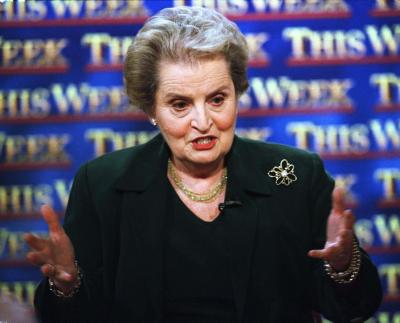 Albright,
Solana Say No To NATO Troops In Kosovo
Albright,
Solana Say No To NATO Troops In Kosovo
WASHINGTON (Reuters) - NATO Secretary General Javier Solana and Secretary of State Madeleine Albright both said Sunday no allied ground troops would be sent to Kosovo now, but neither totally ruled out sending them later.
"This hand of terror and power that (Yugoslav President Slobodan) Milosevic has held over Kosovo has been and will continue to be ... seriously damaged and weakened in such a way that he will not be able to exercise that kind of power," Albright said on ABC's "This Week". Albright said there was no immediate plan for ground troops, based on an allied assessment of the consequences of such a move at this time.
But she added, "That assessment can be quickly updated and that is where we are."
Solana, interviewed on "Fox News Sunday", ruled out putting troops into the Kosovo area "at this point."
"We are continuing with the same strategy, the strategy of the air campaign. We're going to see it through and ... at this point the alliance has no plans to go into an invasion, as you put it, to Yugoslavia," said the NATO chief.
London's Observer newspaper reported Sunday that NATO was changing tack and drafting plans for possibly sending up to 100,000 troops into Kosovo as early as late May.
In Britain's Sunday Times newspaper, President Clinton called Milosevic a "belligerent tyrant" and "Europe's worst demagogue" and said any solution would require a major change in Belgrade.
Clinton has been in telephone contact with British Prime Minister Tony Blair, Canadian Prime Minister Jean Chretien and French President Jacques Chirac, White House spokesman Barry Toiv said Sunday.
"In (Clinton's) conversations with the three leaders yesterday, they all agreed on the need to use the NATO summit to help sustain the alliance in its action," Toiv said, referring to the three-day meeting beginning Friday in Washington to celebrate the alliance's 50th anniversary.
"We do anticipate some serious work with respect to Kosovo," Toiv said, but declined to say whether the U.S. would make any new initiatives regarding Kosovo at the summit
He said the White House would deliver as early as Monday its emergency funding request for the Yugoslavia air war and humanitarian operations. Administration officials have said the request would ask for $5.9 billion.
"We hope that we'll get swift action," Toiv said. "I think there's a bipartisan understanding of the need for this package and we think that this legislation will address the critical readiness issues that face us for the remainder of this fiscal year."
He declined to say whether the administration was hoping for congressional action before the NATO summit starts.
The U.S. ambassador-at-large for war crimes, David Scheffer, displayed aerial photographs on "Fox News Sunday" program that he said provided evidence of new mass graves.
"This particular site is a classic example of ethnic cleansing," Scheffer said, showing a two-part image, with one side picturing an empty field and the second, of the same location several weeks later, of what he said was a mass burial ground.
"It clearly correlates with other examples that we've seen in Kosovo recently," Scheffer said.
Republican Sen. Judd Gregg of New Hampshire said on NBC's "Meet the Press" he would vote against sending ground troops to Kosovo.
"Our strategic interests in that region are really very limited when compared with the strategic events that are occurring around the world," he said. "I would point to Russia as an area where we do have a dramatic strategic interest."
Sen. Richard Lugar of Indiana criticized fellow Republicans who were silent on Kosovo out of bitterness over the outcome of the Clinton impeachment drama or because current fighting is merely the latest skirmish in an ancient battle in the region.
"They've got to get over it," Lugar, who sits on the Senate Foreign Relations Committee, said on "Meet the Press". "NATO is on the right side of history. Ethnic cleansing has got to stop. And the American people support that. They're prepared really to support a ground war."
First lady Hillary Rodham Clinton was considering
traveling to Albania for a first-hand look at humanitarian relief operations
for Kosovo refugees, Mrs. Clinton's spokeswoman said Sunday.